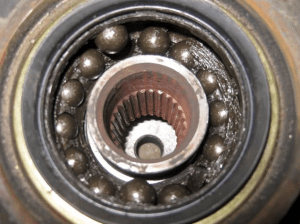Have you been hearing a grinding sound coming from the area of your wheels? Does the sound get louder as you driver faster? Most likely, it’s a bad wheel bearing. If that’s the case, you will want to have it replaced. While a wheel bearing doesn’t typically fail immediately, you don’t want to put off replacing one for too long. Otherwise, you are at risk of having an accident – one that could be serious. This blog post will provide you with more information on how wheel bearings work and how to tell if they are worn out.
A wheel bearing assembly is made up of a set of steel ball bearings that are packed with grease and enclosed in a metal ring that’s called a race. Located at the end of each axle shaft inside a part known as a hub, wheel bearings help reduce friction as your wheels spin. Over time, the wheel bearings begin to accumulate contaminants from the outside and will wear out. When they do, you will start to notice some of the following symptoms:
- You will hear a grinding or grating noise that seems to be coming from one of the wheels. This is definitely the most common symptom that a wheel bearing is bad. It’s not always easy to tell which wheel is making the noise. One thing to remember is that the grinding noise will get louder as you drive faster. The noise is occurring because metal is now grinding on metal.
- The tires may show signs of uneven wear. Yes, there are a lot of things that can cause your tires to wear unevenly. A bad wheel bearing is one of them. Why does this happen? A faulty wheel bearing allows for more “play” in the wheel which causes it to vibrate more. With a bad wheel bearing the uneven wear will show more on one tire.
- You feel more vibration in the steering wheel or your vehicle will pull to one side. Typically, the steering wheel vibration from a bad bearing will be noticed at slower speeds and will get worse as you accelerate.
- The steering may feel “loose.” This is one sign you may not notice on your own. You can check this out by putting your car up on a jack and after grabbing the wheel on opposite sides, attempting to rock it back and forth. If the wheel bearing is okay, the wheel won’t wobble. If the wheel bearing is worn out, you will notice that the tire and wheel assembly will move back and forth.
Can you drive with a bad wheel bearing?
As mentioned, a wheel bearing that is just starting to show signs of a problem isn’t likely to fail right away. That doesn’t mean you should put off having it replaced. Because of the vibrations and extra wheel play, a bad wheel bearing will begin to put pressure on other steering and suspension components. It may end up causing damage to the hub, CV joint, and axle to name a few. Even worse, if left unfixed, a worn wheel bearing could fail completely and cause the wheel to seize while you are driving. That would most likely result in a serious accident.
Think you have a problem with a wheel bearing? Don’t leave it to chance. Bring your vehicle into our auto repair shop located in Ft. Collins, Colorado. Our technicians will be able to inspect your vehicle and let you know if you need to replace a wheel bearing. Give us a call or stop by our shop today.

